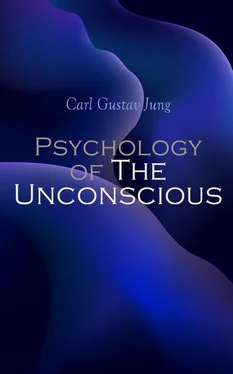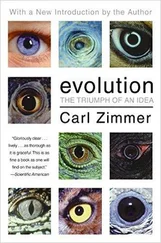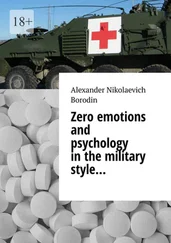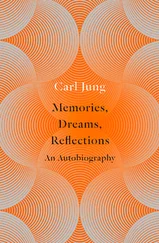Carl Jung - Psychology of The Unconscious
Здесь есть возможность читать онлайн «Carl Jung - Psychology of The Unconscious» — ознакомительный отрывок электронной книги совершенно бесплатно, а после прочтения отрывка купить полную версию. В некоторых случаях можно слушать аудио, скачать через торрент в формате fb2 и присутствует краткое содержание. Жанр: unrecognised, на английском языке. Описание произведения, (предисловие) а так же отзывы посетителей доступны на портале библиотеки ЛибКат.
- Название:Psychology of The Unconscious
- Автор:
- Жанр:
- Год:неизвестен
- ISBN:нет данных
- Рейтинг книги:4 / 5. Голосов: 1
-
Избранное:Добавить в избранное
- Отзывы:
-
Ваша оценка:
- 80
- 1
- 2
- 3
- 4
- 5
Psychology of The Unconscious: краткое содержание, описание и аннотация
Предлагаем к чтению аннотацию, описание, краткое содержание или предисловие (зависит от того, что написал сам автор книги «Psychology of The Unconscious»). Если вы не нашли необходимую информацию о книге — напишите в комментариях, мы постараемся отыскать её.
Psychology of The Unconscious — читать онлайн ознакомительный отрывок
Ниже представлен текст книги, разбитый по страницам. Система сохранения места последней прочитанной страницы, позволяет с удобством читать онлайн бесплатно книгу «Psychology of The Unconscious», без необходимости каждый раз заново искать на чём Вы остановились. Поставьте закладку, и сможете в любой момент перейти на страницу, на которой закончили чтение.
Интервал:
Закладка:
“Cast all your anxiety upon him, because he careth for you.”—I Peter v: 7.
“In nothing be anxious; but in every thing by prayer and supplication ... let your requests be made known unto God.”—Phil. iv: 6.
One must give the burdening complex of the soul consciously over to the Deity; that is to say, associate it with a definite representation complex which is set up as objectively real, as a person who answers those questions, for us unanswerable. To this inner demand belongs the candid avowal of sin and the Christian humility presuming such an avowal. Both are for the purpose of making it possible for one to examine one’s self and to know one’s self. [84]One may consider the mutual avowal of sins as the most powerful support to this work of education (“Confess, therefore, your sins one to another.”—James v: 16). These measures aim at a conscious recognition of the conflicts, thoroughly psychoanalytic, which is also a conditio sine qua non of the psychoanalytic condition of recovery. Just as psychoanalysis in the hands of the physician, a secular method, sets up the real object of transference as the one to take over the conflicts of the oppressed and to solve them, so the Christian religion sets up the Saviour, considered as real; “In whom we have redemption through his blood, the forgiveness of sins....” (Eph. i: 7 and Col. i: 14.) [85]He is the deliverer and redeemer of our guilt, a God who stands above sin, “who did no sin, neither was guile found in his mouth” (Pet. ii: 22). “Who his own self bare our sins in his body upon the tree” (Pet. ii: 24). “Therefore Christ has been sacrificed once to take away the sins of many” (Heb. ix: 28). The God, thus thought of, is distinguished as innocent in himself and as the self-sacrificer. (These qualities are true also for that amount of energy—libido—which belongs to the representation complex designated the Redeemer.) The conscious projection towards which the Christian education aims, offers, therefore, a double benefit: first, one is kept conscious of the conflict (sins) of two opposing tendencies mutually resistant, and through this one prevents a known trouble from becoming, by means of repressing and forgetting, an unknown and therefore so much more tormenting sorrow. Secondly, one lightens one’s burden by surrendering it to him to whom all solutions are known. One must not forget that the individual psychologic roots of the Deity, set up as real by the pious, are concealed from him, and that he, although unaware of this, still bears the burden alone and is still alone with his conflict. This delusion would lead infallibly to the speedy breaking up of the system, for Nature cannot indefinitely be deceived, but the powerful institution of Christianity meets this situation. The command in the book of James is the best expression of the psychologic significance of this: “Bear ye one another’s burdens.” [86]
This is emphasized as especially important in order to preserve society upright through mutual love (Transference); the Pauline writings leave no doubt about this:
“Through love be servants one to another.”— Gal. v: 13.
“Let love of the brethren continue.”— Heb. xiii: 1.
“And let us consider one another to provoke unto love and good works. Not forgetting our own assembling together as is the custom of some, but exhorting one another.”— Heb. x: 24–25.
We might say that the real transference taught in the Christian community is the condition absolutely necessary for the efficacy of the miracle of redemption; the first letter of John comes out frankly with this:
“He that loveth his brother abideth in the light.”—I John ii: 10.
“If we love one another, God abideth in us.”—I John iv: 12.
The Deity continues to be efficacious in the Christian religion only upon the foundation of brotherly love. Consequently, here too the mystery of redemption is the unresisting real transference. [87]One may properly ask one’s self, for what then is the Deity useful, if his efficacy consists only in the real transference ? To this also the evangelical message has a striking answer:
“Men are all brothers in Christ.”
“So Christ also, having been once offered to bear the sins of many, shall appear a second time apart from sin to them that wait for him unto salvation.”— Heb. ix: 28.
The condition of transference among brothers is to be such as between man and Christ, a spiritual one. As the history of ancient cults and certain Christian sects shows, this explanation of the Christian religion is an especially important one biologically, for the psychologic intimacy creates certain shortened ways between men which lead only too easily to that from which Christianity seeks to release them, namely to the sexual relation with all those consequences and necessities under which the really already highly civilized man had to suffer at the beginning of our Christian era. For just as the ancient religious experience was regarded distinctly as a bodily union with the Deity, [88]just so was worship permeated with sexuality of every kind. Sexuality lay only too close to the relations of people with each other. The moral degeneracy of the first Christian century produced a moral reaction arising out of the darkness of the lowest strata of society which was expressed in the second and third centuries at its purest in the two antagonistic religions, Christianity on the one side, and Mithracism on the other. These religions strove after precisely that higher form of social intercourse symbolic of a projected “become flesh” idea (logos), whereby all those strongest impulsive energies of the archaic man, formerly plunging him from one passion into another, [89]and which seemed to the ancients like the compulsion of the evil constellations, as εἱμαρμένη, [90]and which in the sense of later ages might be translated as the driving force of the libido, [91]the δύναμις κινητική [92]of Zeno, could be made use of for social preservation. [93]
It may be assumed most certainly that the domestication of humanity has cost the greatest sacrifices. An age which produced the stoical ideal must certainly have known why and against what it was created. The age of Nero serves to set off effectually the famous extracts from the forty-first letter of Seneca to Lucilius:
“One drags the other into error, and how can we attain to salvation when no one bids us halt, when all the world drives us in deeper?”
“Do you ever come across a man unafraid in danger, untouched by desires, happy in misfortune, peaceful in the midst of a storm, elevated above ordinary mortals, on the same plane as the gods, does not reverence seize you? Are you not compelled to say, ‘Such an exalted being is certainly something different from the miserable body which he inhabits?’ A divine strength rules there, such an excellent mind, full of moderation, raised above all trivialities, which smiles at that which we others fear or strive after: a heavenly power animates such a person, a thing of this kind does not exist without the coöperation of a deity. The largest part of such a being belongs to the region from which he came. Just as the sun’s rays touch the earth in reality and yet are at home only there from whence they come, so an eminent holy man associates with us. He is sent to us that we may learn to know the divine better, and although with us, still really belongs to his original home. He looks thither and reaches towards it; among us he walks as an exalted being.”
The people of this age had grown ripe for identification with the λόγος (word) “become flesh,” for the founding of a new fellowship, united by one idea, [94]in the name of which people could love each other and call each other brothers. [95]The old vague idea of a μεσίτης (Messiah), of a mediator in whose name new ways of love would be created, became a fact, and with that humanity made an immense step forward. This had not been brought about by a speculative, completely sophisticated philosophy, but by an elementary need in the mass of people vegetating in spiritual darkness. The profoundest necessities had evidently driven them towards that, since humanity did not thrive in a state of dissoluteness. [96]The meaning of those cults—I speak of Christianity and Mithracism—is clear; it is a moral restraint of animal impulses. [97]The dynamic appearance of both religions betrays something of that enormous feeling of redemption which animated the first disciples and which we to-day scarcely know how to appreciate, for these old truths are empty to us. Most certainly we should still understand it, had our customs even a breath of ancient brutality, for we can hardly realize in this day the whirlwinds of the unchained libido which roared through the ancient Rome of the Cæsars. The civilized man of the present day seems very far removed from that. He has become merely neurotic. So for us the necessities which brought forth Christianity have actually been lost, since we no longer understand their meaning. We do not know against what it had to protect us. [98]For enlightened people, the so-called religiousness has already approached very close to a neurosis. In the past two thousand years Christianity has done its work and has erected barriers of repression, which protect us from the sight of our own “sinfulness.” The elementary emotions of the libido have come to be unknown to us, for they are carried on in the unconscious; therefore, the belief which combats them has become hollow and empty. Let whoever does not believe that a mask covers our religion, obtain an impression for himself from the appearance of our modern churches, from which style and art have long since fled.
Читать дальшеИнтервал:
Закладка:
Похожие книги на «Psychology of The Unconscious»
Представляем Вашему вниманию похожие книги на «Psychology of The Unconscious» списком для выбора. Мы отобрали схожую по названию и смыслу литературу в надежде предоставить читателям больше вариантов отыскать новые, интересные, ещё непрочитанные произведения.
Обсуждение, отзывы о книге «Psychology of The Unconscious» и просто собственные мнения читателей. Оставьте ваши комментарии, напишите, что Вы думаете о произведении, его смысле или главных героях. Укажите что конкретно понравилось, а что нет, и почему Вы так считаете.












